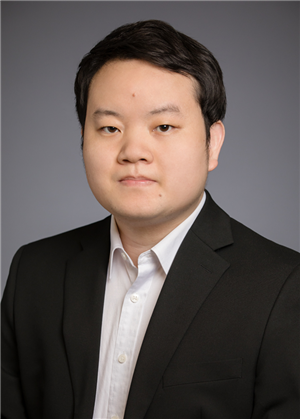Image of Hua Wang.
Urbana, Ill. – Funded by the Faculty Early Career Development Program, CCIL researcher and assistant professor of materials science and engineering, Hua Wang, was recognized as a promising academic. Wang will receive a five-year, $700,000 award supporting his research, entitled “Rational Design of Immune Cell-homing Biomaterials for Immune Regulation.”
“(The award) makes you feel differently,” he added. “(It’s like), ‘OK. My research idea and my lab and myself have been accepted by those people in this field. That they think I have the potential to have a successful program, and that’s something very special to me.”
When introducing materials to the immune system to fight off cancer or disease, the human body may negatively react or even reject the material. This rejection has been the focal point in so many biomaterial research efforts. Wang, however, believes he can leverage the immune system’s response to improve the performance of the implanted materials against diseases.
“My hope is that among those immune responses some of them are beneficial,” Wang said. “While the overall immune system may not function properly in (the) face of cancer cells or pathogens, it can be re-trained by immunoengineering strategies in a way to treat the disease better.”
If Wang can develop a platform that allows precise control of immune cells and the overall immune responses in the body, then he’ll help us be that much closer to discovering new and effective therapies for cancers and other diseases.
Wang aims to make a prototype consisting of chemokine-loaded macroporous biomaterials, which can lure in high numbers of desired immune cells from other parts of the body.
“These recruited immune cells can be re-trained in the materials before they migrate back to the body to generate desired immune responses,” Wang said.
In his efforts to design materials that can recruit desired immune cells, Wang will study how the chemical and mechanical material properties decide which types of immune cells to lure in from other parts of the body. The biomaterial will be injected under the skin to help modulate the immune cells throughout the entire body.
“The immune cells have receptors on the cell membrane that can sense those chemokines released by the biomaterial,” Wang said. “Once they get into the material, they will sense the chemical and mechanical environment within the material which in turn affects their survival, proliferation and escape.”
“By deciphering the role of material properties on the immune cell recruitment, we can eventually rationally design materials that can lure in the type of immune cells we are particularly interested in,” he added.
If Wang can convince the desired types of immune cells to travel, then essentially he can control the function of the immune cells and the overall immune responses in the entire body.
“Those immune responses can be ruminated to treat disease, including cancer,” Wang said.
– Written by Emily Jankauski

